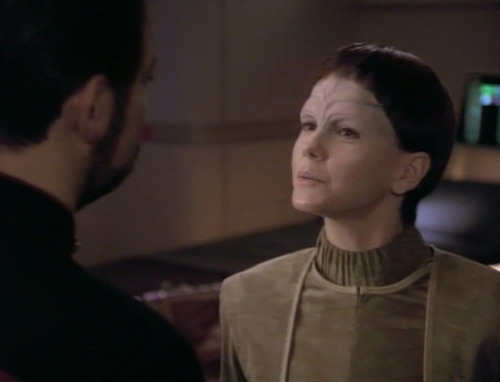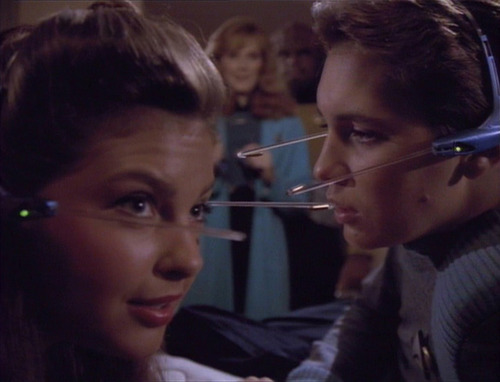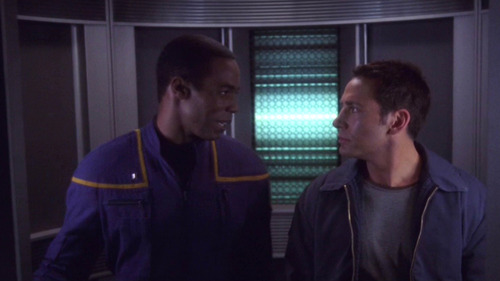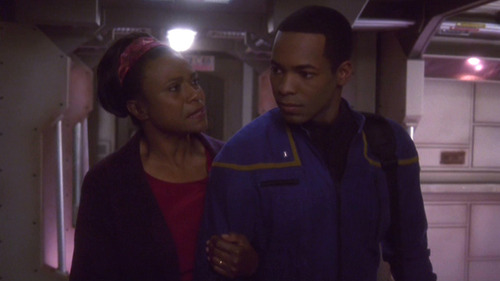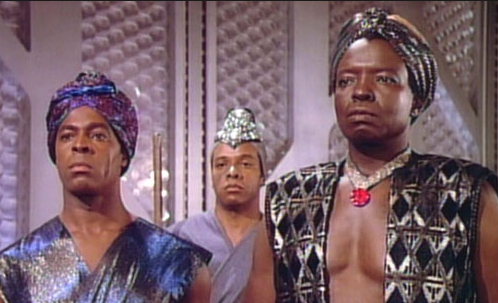I was so happy about today’s SCOTUS ruling finding DOMA unconstitutional. It was bittersweet after the voting rights ruling, but on its own it’s a major win for equality.
The celebratory mood inspired me to take a look at “The Outcast”, which is unfortunately Star Trek’s one real attempt to do justice to the issue of gay rights.
That struggle is presented via allegory in the story of Soren, a J’naii. The J’naii are an androgynous species working with the Enterprise to rescue their shuttle, which is trapped in an area of “null space”. Soren is a skilled J’naii pilot who is very curious about human gender and sexuality.
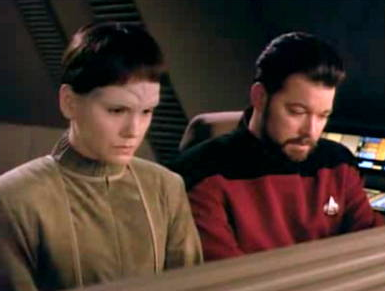
It’s interesting to watch Soren and Riker try to figure out each others’ species. Many times there was a question that, had this scene been written in the original series, would have been guaranteed a cringe-worthy answer based on gender stereotypes. But I was pleasantly surprised almost every time. For example, I can totally live with this:
Soren: What kind of woman do you find attractive?
Riker: I like one who’s intelligent and sure of herself, who I can talk with and get something back. But the most important thing of all? She has to laugh at my jokes.
A minor shuttle accident the next day sends Soren to Doctor Crusher in Sickbay.
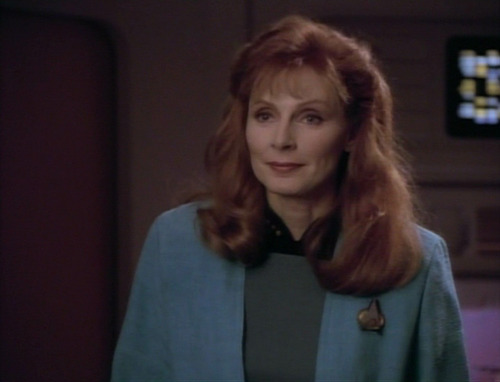
Soren asks Crusher what it’s like to be female and she says: “Well it’s just the way I am. I’ve never thought about what it’s like.” Soren also wants to know why women wear makeup, assuming that it means it’s up to women to attract men. Crusher says no – men try to be attractive too – but do it differently.
Lest any sexist or homophobic Trekkies are feeling left out, the writers throw them a bit of a bone by having Worf represent their views at the officers’ poker game:
Worf: That is a woman’s game.
Troi: Oh? Why is that?
Worf: All those wild cards. They support a weak hand. A man’s game has no wild cards.
Crusher: Let me get this straight. Are you saying it’s a woman’s game because women are weak and need more help?
Worf: Yes.
Crusher: And just this afternoon I was insisting to one of the J’naii that those attitudes were but a distant memory.
Worf’s reaction here is distinctly weird for two reasons. First, he’s always acknowledged and appreciated the existence of strong women. Second, he’s reminding me a little too much of my grandpa, and not in a good way.
Let’s skip back to Soren and Riker, who are in the shuttle getting ready to take another run at the null space.
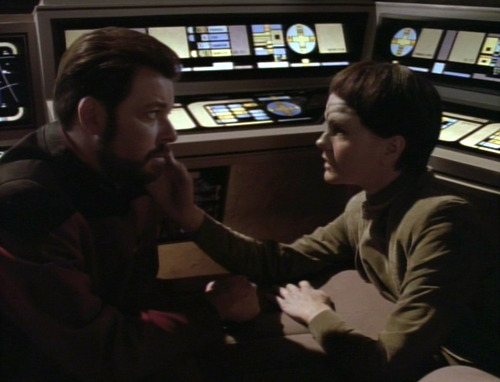
Soren finally confides in Riker that she is attracted to him and has female urges, but that is forbidden on her planet. Those who are even rumoured to prefer a gender are humiliated and seen as sick, in need of “curing” through psychotectic therapy. It’s a poignant scene and one that no doubt resonates with a lot of kids who endured or witnessed homophobic bullying:
I remember when I was very young, before I knew what I was, there was a rumour in my school that one of the students preferred a gender, in that case, male. The children started making fun of him, and every day they were more cruel They could tell he was afraid and somehow that seemed to encourage them. One morning in class, he appeared, bleeding and in ripped clothes. He said he had fallen down. And of course the school authorities found out and took him away, and gave him psychotectic treatments. When he came back, he stood in front of the whole school and told us how happy he was now that he had been cured. After that, I realised how dangerous it was to be different. And once I got older, and knew what I was, I was terrified. I have had to live with that fear ever since.
She tells Riker to think about it while they complete the mission. They go to work and successfully rescue the crew of the lost J’naii shuttle. That night the J’naii throw a party on the planet and Soren and Riker sneak away and have a mad make-out session:
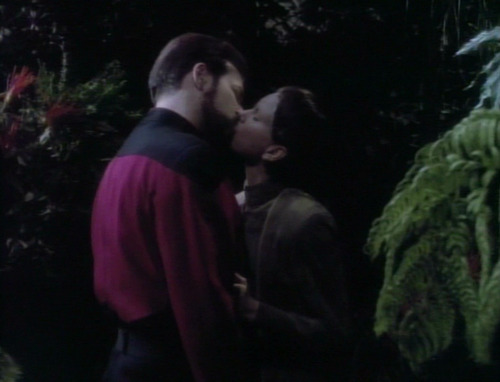
On returning from the planet Riker goes to tell Troi about his new feelings for Soren, because: “you’re my friend. I thought, I don’t know. I thought I should tell you.”
Troi seems pretty much cool with being friend-zoned, which is probably because she’s had a ton of experience with him doing this over the past few years.
Unfortunately, when he goes to Soren’s quarters he’s greeted by other J’naii who say Soren has been taken into custody.
I have to share the video of the next scene, where Soren pleads for understanding and compassion for those like her who are different, because every word is important.
Other reviewers have said they feel the actress playing Soren, Melinda Culea, doesn’t do this role justice. They have argued the monotone she adopts in order to seem more androgynous makes the speech lack passion. But I disagreed (as did my boyfriend, Jason, whom I asked to watch this with me so I could use him as a sounding board after). The words had so much resonance that I was actually emotional.
Unfortunately, the episode ends sadly. Riker disobeys the Prime Directive and goes to rescue Soren. When they arrive they find she has already been “cured”: despite Riker telling her he loves her, she says she knows now she was sick and this was all a mistake.
There is one thing glaringly wrong with this episode. Jamahl Epsicokhan does a good job summarizing it:
It’s so obviously an allegory about the discriminatory issues facing gays, and yet, in the 24th century, there apparently is no such thing as homosexuality. Riker and Soren have lengthy conversations about sexuality and human sex roles (and these discussions touch upon only the most conventional of sexual and gender roles, ignoring the rest), but there isn’t so much as a word that homosexuality exists — or ever existed in human history.
Having all the Starfleet characters (Soren also chats with Crusher and the others talk about gender and the J’naii) fail to mention that homosexuality exists among humans gives an out for homophobic audience members and falls short of fully committing to the issue of LGBT equality.
There was another choice in this episode that is debatable: the choice to cast all women in the J’naii roles. It is certainly hard for a human viewer to see Soren as anything other than female the entire time, so again it’s less challenging. Jonathan Frakes is on the record as saying the episode might have been better with a man playing Soren, but Rick Berman shot down the idea, saying: “having Riker engaged in passionate kisses with a male actor might have been a little unpalatable to viewers.”
Finally, if I got to tweak the episode slightly I might have chosen a more hopeful ending. It’s a bit odd that they show the psychotectic therapy actually working, since it’s a parallel to the bogus idea of “gay reparative therapy”. Jason said he expected at the end that Soren would refuse to leave the planet because she’d decided to stay and fight for equality, but that she wouldn’t really be able to be changed.
Overall, if you look at the episode in the whole of Star Trek, it is not good enough. Even the good things in it can’t make up for the almost total lack of LGBTQ characters everywhere else.
But there are significant good things in “The Outcast”. Both the scene where Soren is telling Riker about her experience feeling different as a child, and the scene where she stands up to the court, are inspiring and potentially really useful teaching tools.
What we learned from this episode:
- Star Trek has a much easier time tackling social equality issues through alien allegories than actually having human main characters embody them
- Star Trek came a long way from 1966 to 1992
- Star Trek still has a long way to go
Bechdel-Wallace Test: Pass. Soren talks to Doctor Crusher about men and women but it’s not about a specific man and not only about men, so it qualifies.







